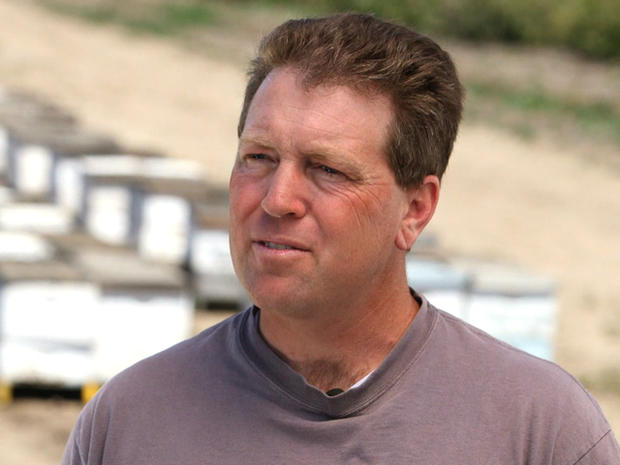Pesticide blamed for declining bee population
(CBS News) CAMARILLO, Calif. - For the food we it, we depend on something else most of us don't think about -- bees. Without them, the agriculture industry estimates that one-third of the food we eat would disappear. But right now, it's the bees that are disappearing.
Overall this winter time we lost close to 3,000 beehives," said commercial beekeeper Larry Pender. He has just 1,800 hives now and hires them out to pollinate fruits, vegetables and nuts on 70 farms across the west, like this blueberry farm near L.A.
"Each hive has somewhere around 30-40,000 bees in it," he said.
Deepening honey bee crisis creates worry over food supply
Plight of the American bumblebee: Disappearing?
For the last eight years, bee populations have been in freefall. But Pender said this year is worse by far.
"All of a sudden we open up the box and there's no bees in that box," he said.
They become disoriented, can't find their way back to the hives, and die in the fields. Nationwide beekeepers say they've lost on average 40-50 percent of their hives. Pender blames a new class of pesticide - neonicotinoids -- based on nicotine, which went into wide use in 2005.
Pender said he had seen the neonicotinoids actually have an impact on his bee population. "When we put our bees next to fields where they use the neonicotinoides, our bees die," he said.
Earlier pesticides were sprayed on crops. Neonicotinoids can be coated on seeds and infused through the plant as it grows. They're very effective against harmful insects.
When CBS News asked the largest pesticide industry group whether bees are harmed as well, CropLife America gave us this statement: "Ongoing research and field studies have consistently found no adverse effects on colonies when ...neonicotinoids are applied...according to label directions.
Watch a "60 Minutes" report on the shrinking bee population.
At U.C. Davis Eric Mussen studies bees. He said they're under assault by numerous agricultural chemicals.
"The honeybees are operating in a toxic soup" he said. "All these chemicals that are out there that we don't know how they interact with each other -- it's too many stressors and it's just overwhelming and the bees just finally give in."
The European Union has proposed a temporary ban of neonicotinoids. Here, the EPA said more review is needed.
"I can't wait for scientists to prove something works or doesn't work," said Pender. "I can't wait for the regulators to take their time, because we need these bees now."
Pender lost a half million dollars last year and laid off five of his seven workers. He said he can't survive another year like that.
But Pender may have to wait. CBS News checked in with the EPA Tuesday and they said their review of those pesticides should be completed in five years.

